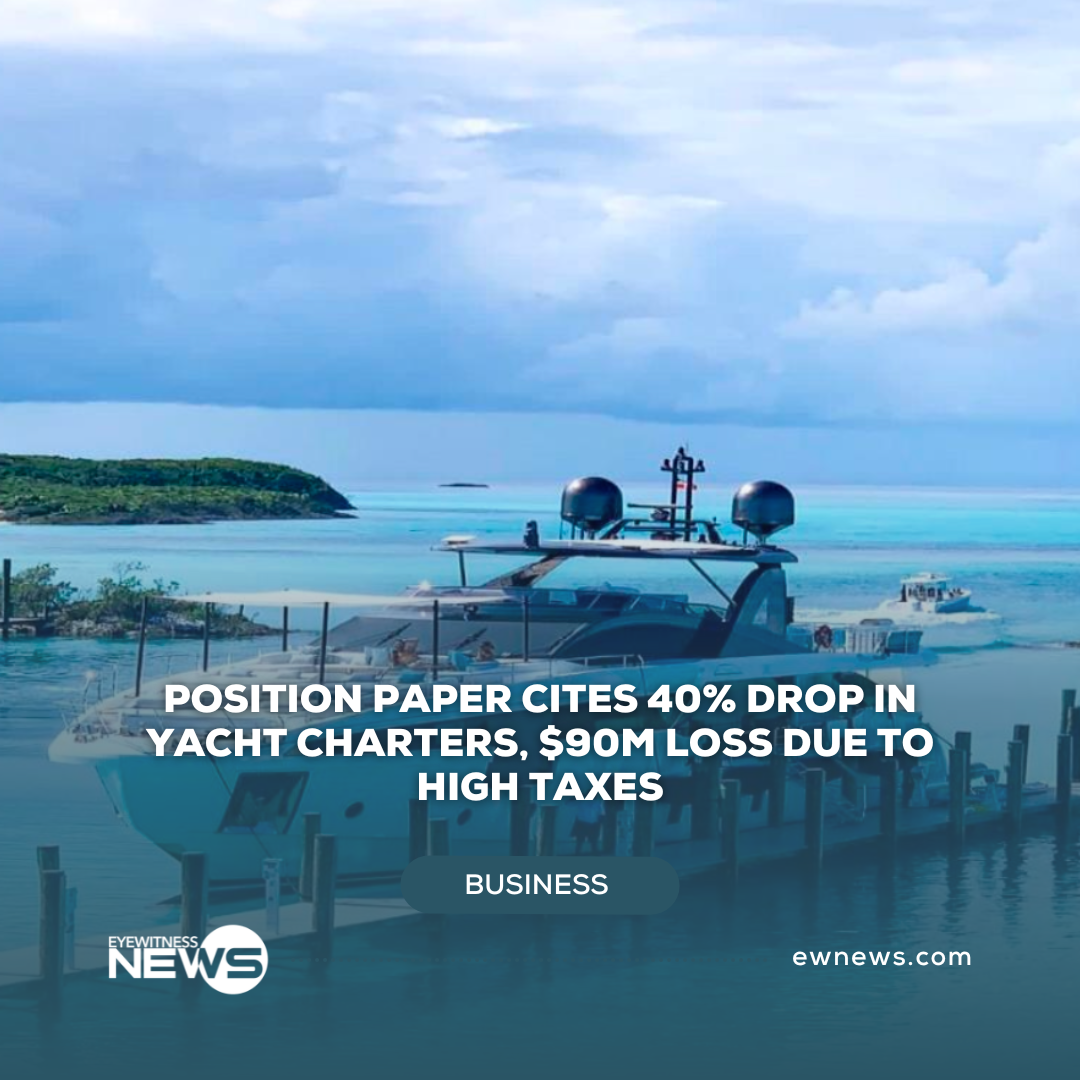NASSAU, BAHAMAS- The 2022 implementation of a 10 percent VAT on yacht charters, combined with a four percent port fee, has led to a 40 percent decline in yacht charters and a $90 million revenue loss due to concerns over the high tax rate, according to an industry position paper.
The paper, titled “Yachting in The Bahamas: An Overview of Our Yachting Industry, Economic Impact, Industry Challenges, and Future Outlook”, written by Marcel Amann, Founder/Director of Yacht Services Bahamas Ltd., highlighted that the yachting sector contributes to $500 million annually to The Bahamas’ economy. However, it noted that recent tax measures have dampened activity.
In 2023, the country welcomed a record 9.65 million visitors, many of whom engaged in yachting services. According to the position paper, each yacht can generate between $100,000 to $300,000 in local economic activity, supporting services like provisioning, maintenance, and hospitality. The Bahamas hosts 60 percent of the superyachts visiting the Caribbean, providing significant employment opportunities, with each yacht supporting at least five local jobs.
According to the position paper other Caribbean nations, such as Puerto Rico, have capitalized on the yachting sector by offering high-end repair and refit facilities. In 2022, The Bahamas’ yachting supply chain generated nearly $50 million in tax revenues, showcasing the sector’s broader fiscal impact. A more supportive regulatory environment could further unlock economic growth.
“The evolving regulatory landscape in The Bahamas has introduced both opportunities and challenges for the yachting industry,” the paper noted. The 10 percent VAT and four percent port fee have led to concerns over the 14 percent combined tax rate, contributing to a 40 percent decline in yacht charters and affecting related sectors like provisioning and hospitality. Administrative hurdles, such as the requirement to obtain a Taxpayer Identification Number (TIN) for VAT compliance, have also complicated operations, pushing some yachts to consider destinations like Puerto Rico or the Dominican Republic. In 2023, several hundred yachts and boats left The Bahamas’ registry due to regulatory challenges,” the paper noted.
The Bahamas, the paper noted, is also enhancing its maritime infrastructure to meet the growing demand for yachts and superyachts. Key developments include Albany Marina and Hurricane Hole Superyacht Marina, designed to attract high-net-worth yacht owners with luxury amenities. Projects like the Legendary Marina Resort, opening in 2025, and expansions at Bakers Bay Golf & Ocean Club will further boost the sector’s capacity. Upgrades to existing marinas, such as Bay Street Marina, have also modernized offerings, reinforcing The Bahamas’ position as a leading yachting destination in the Caribbean.
However, matching these infrastructure improvements with streamlined regulatory processes and investments in services like yacht maintenance and repair will be crucial for maximizing the industry’s potential.
To regain competitiveness, the paper recommended revisiting tax policies, streamlining compliance, and reinvesting in the sector. It was noted that it is shifting toward multi-destination trips across the Caribbean, as yacht owners seek longer stays, privacy, and unique cultural experiences. To remain competitive, it was noted that The Bahamas must improve marina services, streamline regulations, and collaborate regionally.
The paper suggested several key solutions that could unlock the full potential of the Bahamian yachting industry. Regulatory reforms, such as allowing Bahamian charter agents direct access to the booking process, could help local businesses compete with foreign operators. Establishing vocational programs in yacht repair, maintenance, and hospitality could enhance local employment opportunities, as seen in Puerto Rico and Antigua. Providing tax breaks or reduced fees for locally operated yachting services would encourage greater participation from Bahamian companies.
The paper emphasized that implementing these solutions offers significant benefits to The Bahamas in terms of revenue generation and economic activity. The yachting industry already contributes substantially to government revenues through import duties, business licenses, and local taxes. In 2021, the sector generated approximately $50 million in tax revenue, and it supports thousands of jobs, both directly and indirectly, including marina staff, yacht maintenance workers, hospitality professionals, and local suppliers.






